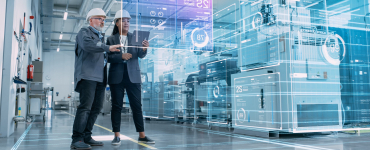- Two thirds of the jobs our children will have don’t exist yet
- Digitalization is transforming many job descriptions
- Lifelong learning is basic requirement for professional success
The demands made of workers are changing faster than ever with the digitalization of our world of work. “We find ourselves in the midst of a digital structural transformation, which completely interconnects production processes. This means that the world of work is changing permanently, and faster and faster,” says Lucia Falkenberg, Personnel Manager and Leader of the Competence Group New Work in eco – Association of the Internet Industry. “Alongside IT knowledge, we especially need key human qualities like creativity, empathy and non-linear thinking for the Industrial Revolution 4.0.”
Majority of future professions do not exist yet
“In 2035, 65 percent of our children will work in professions that simply don’t exist in that form today,” Marcus K. Reif, HR expert and Chief People Officer of the personnel and management consultancy Kienbaum, estimates. When people, machines, factories, logistics and products communicate and cooperate with one another, then completely new skills profiles are needed. “Many new jobs will be created that we can’t even imagine today – this is something we’ve learned from the history of industrialization,” Reif continues.
In Industry 4.0, traditional and digital areas that until now had nothing to do with one another, are merging. Core qualifications for the future are therefore self management, the preparedness to engage in lifelong learning, and openness towards technologies. “Artificial Intelligence, robotics, biotechnology and machine learning are only some of the developments that will change the business models of companies and the way people work and collaborate,” Falkenberg adds.
Rapid adaptability is required
The demands made of workers is also tending to grow with digitalization. In the end, workers will need to take on a greater number of highly complex tasks that are difficult to automate. Current and future generations are faced with the challenge of constantly needing to adapt to change. The speed of the change processes means that there is an increasing need for further education, retraining and professional development within the company.
“This is also shaping today’s career models, which are becoming less linear, and are constantly demanding further qualifications,” says Falkenberg. When management and staff recognize the necessity of lifelong learning, then they create an organization that is learning – in other words, a company that enables staff personal advancement. “That is an important element of a Corporate Social Responsibility (CSR) strategy. In this way, companies can operate economically and sustainably and secure their competitive advantage.”
Finding the right staff for your German operations
Dedicated employers in the eco Association who are adapting to the changing working conditions and who engage themselves in special ways for their staff have the possibility to present themselves on the German employment platform http://www.csr-jobs.de/. eco member companies can obtain special conditions for a premium profile for targeted recruiting. In the choice of preferred employer, topics like ability to reconcile work and family, flexible working times, and health management are decisive. Companies interested in presenting themselves should contact rene.bernard@eco.de.
For information on other services and support for eco members in the German market, please contact cometogermany@eco.de.
A photo of Lucia Falkenberg, leader of the competence group New Work, is available here.




